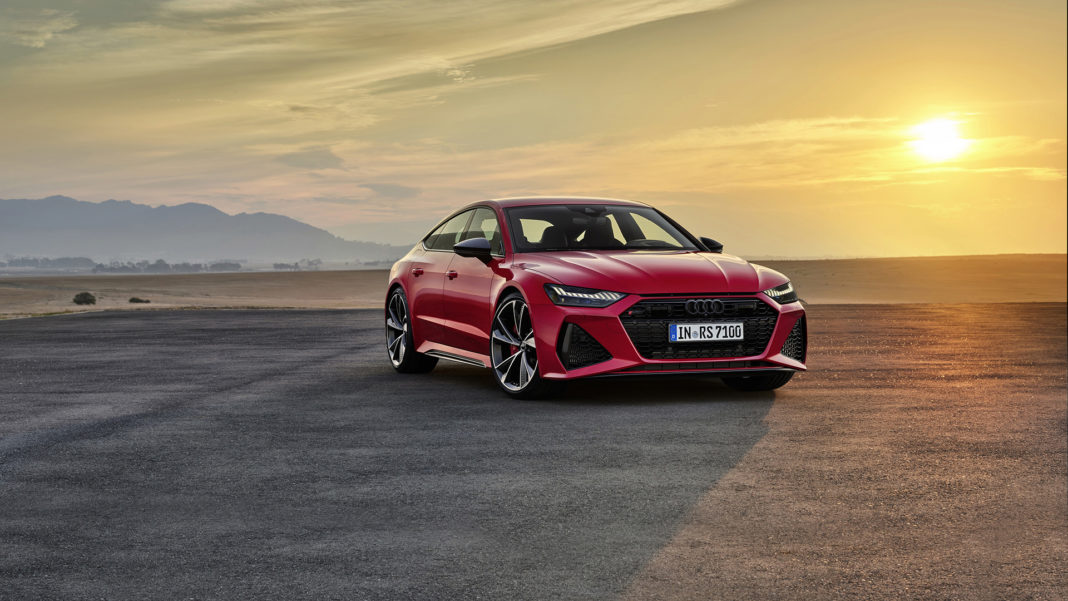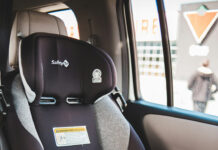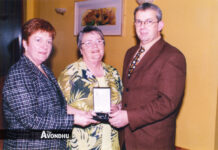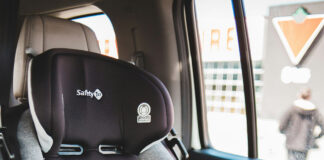The new Audi RS 7 Sportback (combined fuel consumption in l/100 km: 11.6 – 11.4 combined CO2 emissions in g/km: 265 – 261) marks the model’s second generation and is more unique than ever before.
At the International Motor Show (IAA) in Frankfurt, Audi Sport GmbH will be presenting the RS 7 Sportback as a wide bodied five-seater for the first time, also showcasing the improve performance and efficiency delivered by a mild hybrid system.
The RS 7 Sportback will be arriving at dealerships in Ireland at the end of 2019.
Innovative: the exterior design
The new Audi RS 7 Sportback sits low to the ground. The flared wheel arches emphasise the relentlessly sporty nature of the high-performance model from Audi Sport.
The new RS 7 Sportback shares the coupé-like lines of the base model’s body, but only in four areas: the hood, the roof, the front doors and the tailgate. The RS-specific exterior design gives the 5,009-millimetre grand tourer a character all of its own.
The front of the new RS 7 Sportback features a broad, flat Singleframe with no contrasting border. The radiator protective grille with its RS-specific three-dimensional honeycomb structure has retained its gloss black appearance.
Large front air inlets and vertical fins in gloss black add to the aggressive styling. A horizontal blade marks a distinctive downward edge to the front end.
The rear end’s curved trailing edge and strip of lights linking the main rear lights make it one of the characteristic defining features of the RS 7 Sportback. At a speed of 100 km/h, a spoiler will extend from the tailgate.
The RS exhaust system, with a large, chrome-coloured oval tailpipe on each side, sits beneath an RS-specific bumper with a rear diffuser and design elements in gloss black. The new RS 7 Sportback comes with LED headlights fitted as standard.
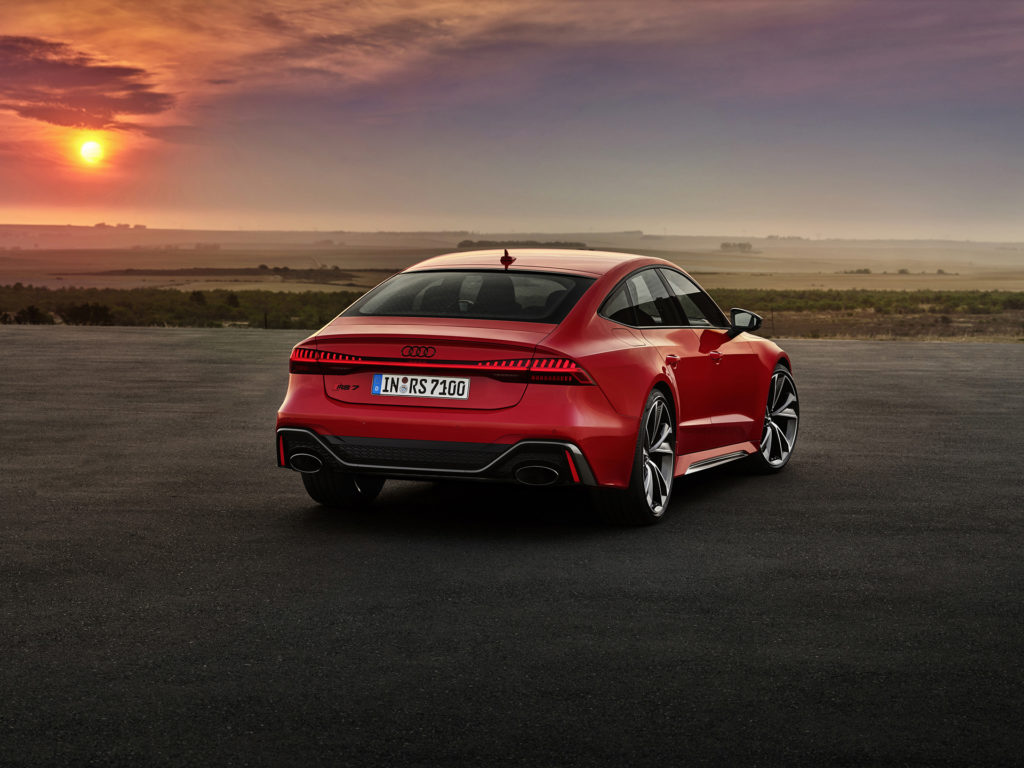
V8 power: the drive system
The 4.0 TFSI in the new Audi RS 7 Sportback produces 600hpand delivers 800 Nm of torque within a broad range from 2,050 to 4,500 rpm. The high-performance Sportback will sprint from 0 to 100 km/h in only 3.6 seconds.
The top speed is electronically limited to 250 km/h; this can be increased to 280 km/h with the Dynamic package and to 305 km/h with the Dynamic plus package.
Thanks to its mild hybrid system (MHEV) with a 48-volt main on-board electrical system, the 4.0 TFSI combines maximum performance with high efficiency.
The belt alternator starter can recover up to 12 kW power under gentle acceleration and feed it into a lithium-ion battery as electricity.
If the driver releases the accelerator at a speed between 55 and 160 km/h, the drive management will select one of two options. Depending on the driving situation and the settings in Audi drive select, the new RS 7 Sportback will either recover energy or coast with the engine switched off.
When the driver steps on the accelerator, the belt alternator starter will start the engine again. MHEV technology allows for start-stop mode at speeds below 22 km/h. As soon as the vehicle in front of the new RS 7 Sportback starts moving, the engine will spring back to life—even if the brakes are applied.
With the MHEV-technology it is possible to reduce fuel consumption by as much as 0.8 litres per 100 kilometres.
The four-litre engine produces a full-bodied and sporty V8 sound. The Audi drive select dynamic handling system allows adjustments to the loud growl of the power unit.
The power produced by the 4.0 TFSI flows via the standard eight-speed tiptronic transmission with optimised shift times and a new launch control function to the quattro permanent all-wheel drive system.
Drive forces are distributed to the front and rear axles in a 40:60 ratio via the purely mechanical centre differential. If one wheel slips, more drive torque automatically goes to the axle with the better traction.
Up to 70% can flow to the front wheels and up to 85% to the back wheels.
Agility as standard: the suspension
Five-link front and rear axles handle the lateral and longitudinal forces independently on the new RS 7 Sportback. The linkages and the subframes are made largely of aluminium. The track is 1,668 millimetres at the front and 1,650 millimetres at the rear.
The standard RS adaptive air suspension with controlled damping has been tuned specifically to suit the RS and now allows the new RS 7 Sportback to reach a top speed of 305 km/h thanks to a new air spring module with a spring rate 50% higher.
The sport air suspension can be set to three modes and includes automatic level control. In the normal position, the body of the new RS 7 Sportback sits 20 millimetres lower than an Audi A7 Sportback with standard suspension.
At speeds above 120 km/h, it will drop by a further 10 millimetres and offer a lift mode enabling the vehicle to be raised by 20 millimetres if requested.
A driver can determine the character of an RS 7 Sportback using the Audi drive select dynamic handling system. There are six profiles available: comfort, auto, dynamic, efficiency and the customisable RS-specific RS1 and RS2 modes, which can be enabled directly via an RS MODE button on the steering wheel.
Sporty and futuristic: the interior
A stripped-down look with sporty accents are the key stylistic elements in the interior of the new Audi RS 7 Sportback. Much like the exterior design, the design language combines taut, sinewy surfaces with clearly defined contours.
There is plenty of space for the driver and passenger, with the architecture of the interior accomplishing a seamless transition to the futuristic user interface.
The upper MMI touch response display is embedded in the black-paneled architecture in a way that renders it almost impossible to see where the display ends and the surroundings begin.
Special RS displays use the Audi virtual cockpit to provide details of tire pressure, torque, performance, oil temperature, boost pressure, lap times, acceleration, and g-forces. The shift light display prompts the driver to upshift when the rev limit is reached.
All the best equipment: infotainment, assist systems, colours, and materials
For the new RS 7 Sportback, Audi Sport offers an extensive range of convenience, connectivity, and driver assistance equipment. The athletic grand tourer couples relentless sportiness with unfettered long-distance capability. The car will help the driver out in a wide range of situations.
More than 30 assist systems are available, including adaptive cruise assist, intersection assist, lane change warning, curb warning, and 360-degree cameras.
The range of colours for the new Audi RS 7 Sportback encompasses thirteen standard exterior paint finishes, including the two RS-specific shades of Nardo gray and Sebring black, crystal effect, as well as five available matt effect paint finishes.
The exterior mirror housings are gloss black as standard, with aluminium matt or the colour of the car available as options.

